Zagreb Mayor Tomislav Tomašević Says Owes No One Anything, Has Free Hand
ZAGREB, 13 July, 2021 - Zagreb Mayor Tomislav Tomašević said on Monday he had not promised anyone any position in the city nor owned anyone anything, adding that he had a free hand to make decisions he considered to be in the public interest.
"That's how I will act until the end of my term," he said on RTL television.
Tomašević said he was confident the two complaints filed against him with the Conflict of Interest Commission during his first month in office would be dismissed.
Regarding the appointment of Tomislav Lauc to the Srebrnjak Hospital Steering Council, Tomašević said he had been "one of 1,500 contributors" to his campaign and that if the appointment of any of them "to one of the 340 institutions and steering councils in the City of Zagreb is a conflict of interest, then we have a big problem."
He said that if they were experts, the fact that they had been contributors should not disqualify them from being appointed.
Tomašević said the Srebrnjak Hospital Steering Council was not the management, that the hospital director was selected in a public call, and that the director was an employee, whereas the people on the Steering Council were not.
He said the decision on the hospital's new director was up to the Steering Council, not him.
Asked if, after one month in office, he felt that he had taken over the running of the city or was still in "hostile surroundings," Tomašević said a large number of people in the city administration was willing to cooperate and that, "naturally, it will take time to win their trust or not win it."
He reiterated that of the 27 city office heads appointed by his predecessor, ten had resigned and that the offices would be reduced to 16. The heads of the new offices will be selected in public calls, he said.
"We'll appoint the best people. Whether they are members of a party, mine, someone else's or no one's, is unimportant. There will be no faking, they will be real public calls."
Tomašević said the city office for war veterans was not abolished and that it would be part of a new office for protection, health, veterans and persons with disabilities.
He said he was sorry that Damir Vanđelić was resigning as head of the post-earthquake Reconstruction Fund because "we have just established a good dynamic, the (Construction) Ministry, the Fund and the City of Zagreb."
He said a location had been found for construction waste disposal, and reiterated that he hoped "reconstruction will finally begin."
Asked if the city would be able to cover 20% of the reconstruction costs and whether a recently taken HRK 400 million loan would suffice until the end of the year, the mayor said there was no doubt about that and that the loan was "just for liquidity."
He added, however, that "a more serious refinancing of the debt of Zagreb and (utility conglomerate) Holding will ne necessary. We are talking about it with banks and the state."
For more about politics in Croatia, follow TCN's dedicated page.
Political Science Association Slams PM Andrej Plenković's Statements
ZAGREB, 1 June, 2021 - The Croatian Political Science Association (HPD) on Tuesday strongly condemned the criticism PM Andrej Plenković levelled against political scientist Dražen Lalić and the RTL broadcaster, noting that it was an attack not only on an individual but on all political scientists as well as media.
The HPD recalled Plenković's statement that "RTL hired Lalić to vilify (HDZ candidate for Zagreb mayor Davor) Filipović in the worst way possible" and his remark that "those are not unbiased media" but "hirelings paid to demonise a political camp."
"Such an unsubstantiated verbal attack by the Prime Minister against our member and prominent Croatian researcher was not only an ad hominem attack - which as such makes his criticism invalid - but also an attack on the right to express one's opinion and on intellectual freedom. With his inappropriate act, Andrej Plenković has threatened the freedom to express one's professional views and additionally weakened the already weak position of the media," the association said.
It also notes that, considering the disproportion of powers, this type of attack by the PM on a member of the academic community and public intellectual has the potential to instil fear and insecurity in members of the academic community and media alike.
For more about politics in Croatia, follow TCN's dedicated page.
PM Andrej Plenković: Media Are Not Sacrosanct
ZAGREB, 1 June, 2021 - Prime Minister Andrej Plenković told reporters on Monday evening that earlier in the day, when he was commenting on the elections, he was telling the truth and that amounted to no attack on the media because the media, he said, were not sacrosanct that couldn't be talked about.
"I was just telling the truth," Plenković said when asked by reporters whether he had gone too far when commenting on the elections and criticisng several commercial broadcasters.
All those I talked about, including your broadcaster (RTL), used the wrong name of HDZ's candidate for Zagreb mayor in their shows, he said, adding that it had happened several times, even on another TV station and in some print media.
He said "these weren't slips of the tongue" and added that these things had clearly happened "on purpose". "This isn't criticism, I was telling the truth, it isn't an attack on the media. The media aren't sacrosanct so that we cannot talk about it," Plenković said.
Commenting on the statement that the Croatian Journalists' Association (HND) called on him not do it and that it was not his first time, Plenković said that that was "a rude and inappropriate statement by the HND president, who is much more slower and evasive when it comes to criticising (President Zoran) Milanović".
Milanović, he stressed, calls out on the media in a much harsher way. He calls the HRT Yutel, HRT reporters mercenaries of a political party, he calls daily newspapers usurers, he calls on your leadership to remove commentator (Žarko) Puhovski and after that I no longer see him in your (RTL) programme, Plenković said.
He said that HND president Hrvoje Zovko was "much more considerate" when it came to reacting to Milanović. Here he dares to talk about me as Lukashenko, Plenković noted, adding that this was going beyond all bounds, which could be classified as being biased.
It is one thing when those running in the election face off in a political match, and another when someone who presents himself as an independent analyst to the viewers, and they don't know whether you are paying him for it, describes a candidate before the elections in the worst possible way, Plenković said, referring to Dražen Lalić's comments for the RTL.
He recalled that it was not unusual for the media in the world to follow one political option.
There are no newspapers in the world for which one doesn't know whether they're left-wing or conservative, he said.
We cannot, he said, live in the belief that everyone is neutral, impartial, objective and in reality they support some option. "One shouldn't be ashamed of that, but it must be clearly stated," Plenković added.
There are double standards
Plenković also thinks that the media had been generating aggression toward the HDZ and the two key candidates in two big cities.
He said that the public had to realise there were double standards.
Asked to comment on Ivica Puljak's victory in Split, he countered with a question -- how can he have an anti-Semite for deputy mayor.
"The man practically wrote a justification for the Holocaust, and if you don't realise that, then you have a dangerous problem," Plenković said, adding that if it was happening elsewhere, "all associations would attack Puljak".
For more about politics in Croatia, follow TCN's dedicated page.
Zagreb Local Elections 2021 Analysis: No "Ideological Referendums", Strictly Freedom And Solutions Wanted
May 30, 2021 - Following the turbulent public debate of the Zagreb mayor candidates that ended with Tomislav Tomašević winning the capital of Croatia, TCN reporter Ivor Kruljac brings you the Zagreb Local Elections 2021 Analysis, concluding that Zagreb is a city open for all ideologies but in constant search of quality solutions.
It's official – Tomislav Tomašević (seen on the lead image) is the new mayor of Zagreb, the 54th in a row when you look through Zagreb's history.
As a brand new chapter in Zagreb's local politics is turned, many are still uncertain about whether the former mayor Milan Bandić would lose or win another mandate if he hadn't suddenly and prematurely passed away earlier this year. Still, as Jelena Pavičić Vukićević, Bandić's successor joined the mayoral race and came in third place (despite being perceived as the keeper of Bandić's tradition), we could argue that is the indication that Bandić being suspected of corruption (and taken to court on several occasions) could've been the political end for him, had he lived to see the fight. But, of course, given Bandić's strong personality, that indication needs to be taken with a grain of salt, as many believe that not only would Bandić get to the second round of elections - but he'd even win them.
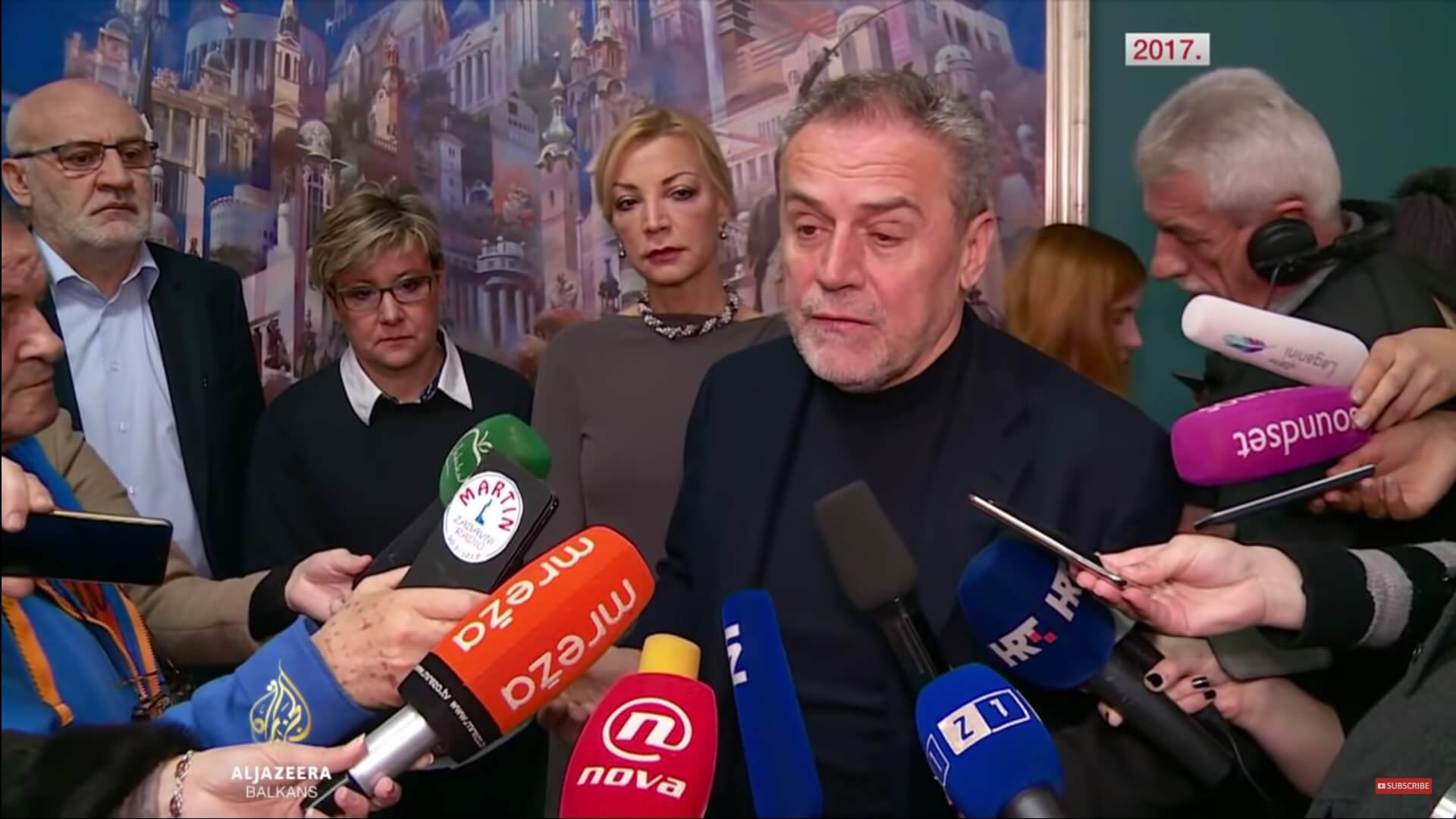
Former Zagreb mayor Milan Bandić, screenshot / Al Jazeera Balkans
A quick recap
In the first round, Tomislav Tomašević from the green-left platform We Can! (Mozemo!) earned a stunning 45,15 percent (147,631) votes. Not only was that twice as more than Škoro and Pavičić Vukičević combined, as N1 reported, but it was also more than with what Milan Bandić won in the second round of local elections back in 2017.
The mayoral race in Zagreb was highlighted with the question of who will succeed Milan Bandić and who will properly address all the debts and unfairly earned employment in the city administration as well as the overpricing of numerous city projects (such as the many fountains and the plagued Sljeme cable car). Additionally, there were the issues of the handling the mess of the Jakuševec junkyard, as well as handling the post-earthquake reconstruction of Zagreb's very heart. The only thing the majority of the candidates agreed to be good were the city's social policies, but they can still be improved.
However, as TCN previously reported, before even officially entering the second round, Miroslav Škoro turned the elections from practical questions of handling corruption to the age old and frankly boring ideological battle, accusing Tomašević and the We Can! (Mozemo!) platform of wanting to revive Yugoslavia.
''That's the extreme left, and it will be stopped in the second round, so help me God“, said Škoro on the night of the first election results.
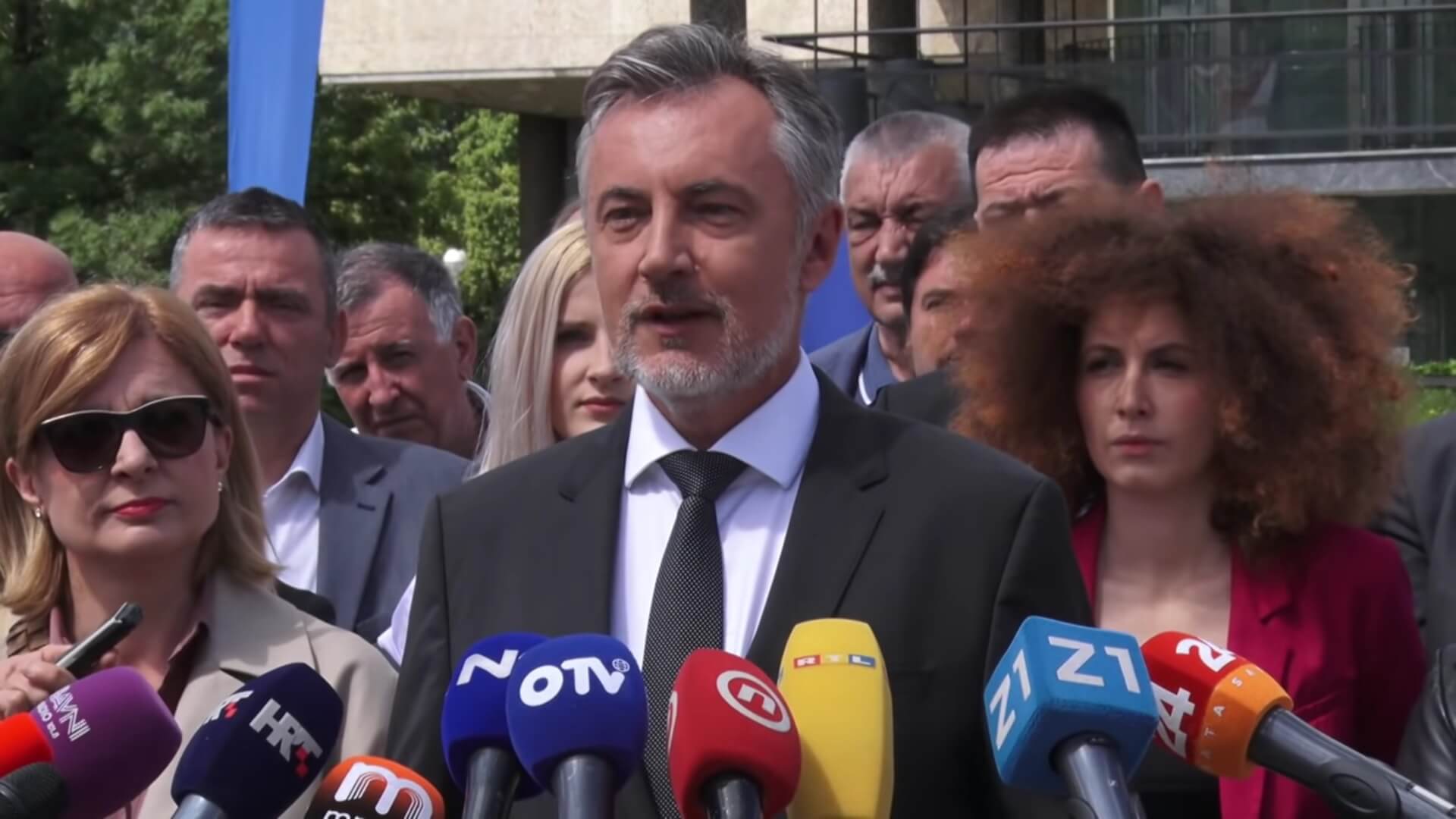
Miroslav Škoro, screenshot / Domovinski Pokret
This sort of rhetoric took everyone by surprise. Dražen Lalić, a sociologist and a professor at the Faculty of Political Sciences at the University of Zagreb, commented for RTL that Škoro himself is a radical candidate and that We Can! (Mozemo!) are neither extreme nor are they the radical left.
''Regardless of Škoro having a doctorate in economis, he's illiterate in the political sense; he doesn't know even the most basic terms. Extreme means outside of the system and not going to the elections. Radical actors are inside the system, and I think Škoro is radical. On the other hand, Tomašević and We Can! (Mozemo!) are very moderate in their attitudes; they're young people. There were no incidents and they are were moderate,'' said Lalić for RTL. He added that Škoro is probably aware that he had absolutely chance of winning but was still trying to reach the far-right electoral body.
24sata columnist Tomislav Klauški wrote about how Škoro's war with the perceived ''extreme left'' is quite literally the only thing in his entire programme. He concluded that such a move isn't going to work for Zagreb, which has never voted for far right options, and he also reminded that former mayor Milan Bandić, despite his many flaws, also came from the social-democratic political option.
''His filthy campaign from the first round, where his agency spread lies that Škare Ožbolt works ''for the Serbs'', where his news sites spread stories that Filipović's father is Serbian, and warned that Tomašević is a concealed right-winger, Škoro is now going further with that into the second wrong. As if Zagreb doesn't have enough problems to talk about,'' wrote Klauški on Monday after the first round.
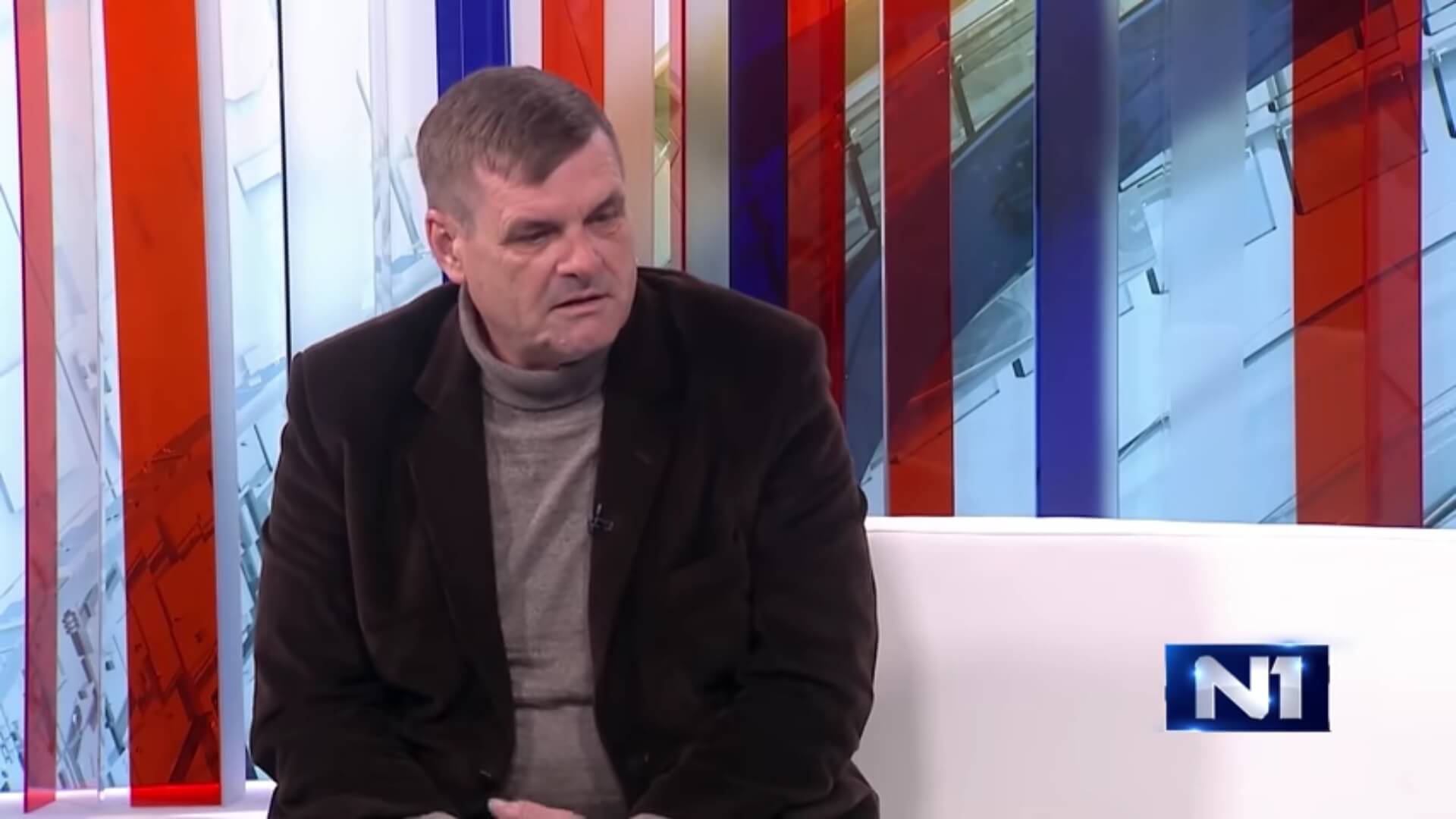
Dražen Lalić, screenshot / N1
Škoro then continued to push the narrative of these elections, declaring them an ideological referendum among right-wing and conservative circles. Škoro also accused We Can! (Mozemo!) of being foreign mercenaries working for famous philanthropist George Soros or wanting to revitalise Yugoslavia, and Škoro's associate Zlatko Hasanbegović stepped out into the Croatian public space calling the party a lesbian syndicate - weird indeed. Additionally, Nikola Grmoja (Most) stated for N1 that Mozemo are iPhone Soroshians, and accusations accompanied by rather odd name-calling saw a random generator on the internet designed to mock these terms by random options. Meanwhile, Tomašević continued his campaign by talking about solutions to the problems Zagreb is currently facing but occasionally making remarks on the accusations by his opponents and sometimes even throwing some accusations in Škoro's direction in return.
67% : 33% K.O.
This focus on actual problems Zagreb is facing and the refusal to dwell into ideological issues, along with the experience of activism for Zagreb's interests, proved to be the winning formula for Tomašević, beating Škoro with amazing 199,630 votes compared to Škoro's 106.300 votes. Not only did Tomašević beat Škoro by far, he also earned more than former mayor Milan Bandić did, and nobody has had more votes in Zagreb's mayoral elections to date.
Škoro lost his own so-called ideological referendum, but let's imagine for a moment that he actually won. Whether Škoro (or some other analysts who believed these elections would finally prove how Zagreb looks at things with an ideological eye) likes it or not, this "referendum" neither proves that Zagreb has turned to some radical left nor does it prove the opposite. First of all, only 45.7% of people voted on the second round of these elections. That's not even half of the total number of citizens that have the right to vote in Zagreb. Secondly, the culture and overall vibe of Zagreb truly tells us that Zagreb is diverse and very much open for everybody.
Zagreb - The pioneer liberal city for every idea
One thing we can say for certain about Zagreb's philosophy, if you will, is that Zagreb is proud to be a pioneer of development and a role model for the rest of the country. To illustrate that, Zagreb was proud that they'd be the first to use telecom lines, and by the time the rest of Croatia got telephones, Zagreb already had mobile phones. Being the capital city of Croatia, and the biggest city in the country, a centre of politics, education, science, culture, and more, Zagreb attracts people from all over the country and abroad, having bloomed into a multi-cultural city whose people have various ideologies and convictions.
When you look at ideological conflict in Croatia, which sadly doesn't seem to be anywhere near its end, it is often perceived that if you're a Croatian nationalist and conservative in Istria, you'll feel quite lonely indeed. On the other hand, left leaning progressives and liberals living in Dalmatia or Slavonia, areas that are known to be quite conservative, can't wait for a chance to leave those areas.
That being said, apologetics of all ideologies head to Zagreb, and Zagreb is a place where looking straightly from an ideological view, everyone is equally happy and miserable at the same time, but overall they're in a better position than in the rest of Croatia is. Before the pandemic, you had a regular event called ''Coffee with non-believers'' hosted by various venues such as Spunk bar or No Sikiriki. The event allowed for all atheists, agnostics, or even religious people unhappy with the breach of secularity by the Catholic Church in Croatia – to find those who think like they do, meet in person, talk, and have a good time.
On the other hand, in the Veliki Tolk pub in Opatovina, you have ''Right-wingers in the Pub'' which provides the same comfort and good times for the conservative-oriented people.
Regardless of what kind of genre of music you listen to, what movies you want to see, what kind of clubs you want to go to, mainstream pop, alternative rock, electronics, jazz... Zagreb's public sphere offers something for everyone.
Zagreb does have hospitals whose doctors refuse to perform abortions, but if there is any place a woman can have her reproductive rights respected in Croatia, then that place is Zagreb. Despite several violent homophobic incidents, the relaxing atmosphere of the LGBTQ Pride picnic on Ribnjak Park, and the support coming for the parade from the windows of Zagreb's buildings show that Zagreb is a safe place, and you won't feel alone because of your sexual preferences.
How these ideologies co-exist in being equally happy and miserable at the same time was perfectly demonstrated over the last two weeks. LGBTQ flags put out for the International Day Against Transphobia were torn down by vandals on the Victims of Fascism Square. A few days later, a pro-life initiative, Hod za Život“ (Walk for life) flags displayed on Ban Jelačić Square, were also quite quickly torn down. And the culmination of that event was seen on Saturday when the pro-life Walk For Life march was met with counter-protesters from Crveni Otpor (Red Resistance), which is pro-choice. So, as we can see, these ideologies create conflict at times, but more often, it's a peaceful co-existence. Equally miserable and happy at the same time, and still in a better position than the rest of the country.
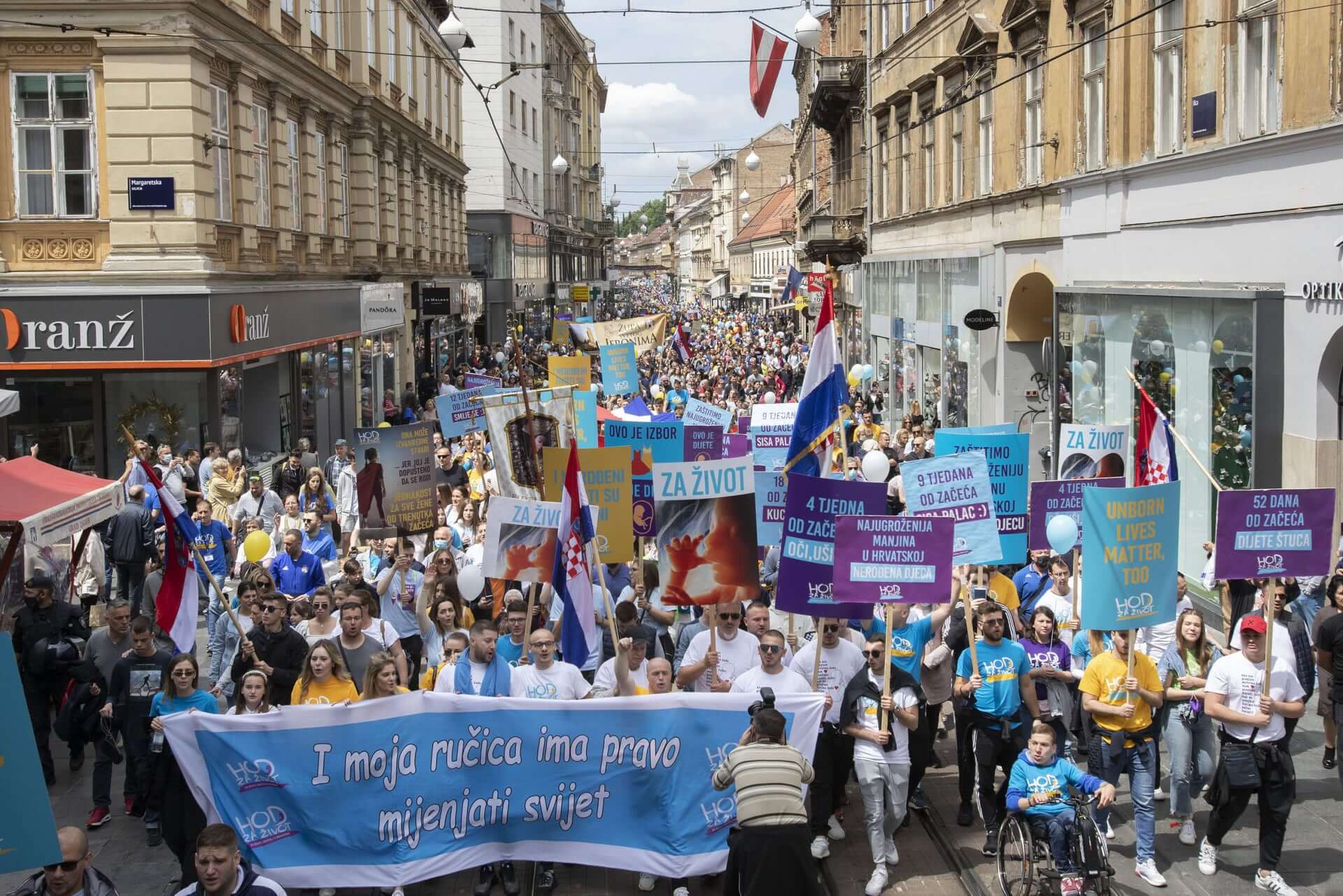
Pro-life march in Zagreb © Hod za život - Zagreb
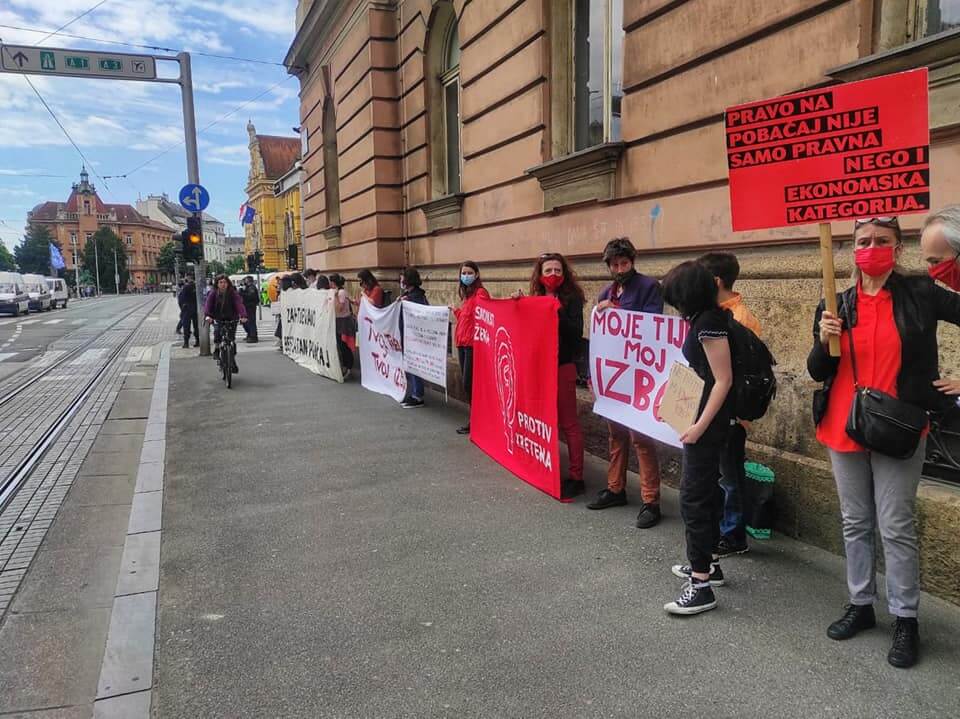
Pro-choice protesters waiting for pro-life march in Zagreb © Faktiv
Zagreb is liberal in its nature, courtesy of the growth and development it has seen, and even in the event that a conservative or even a radical conservative ever took the mayoral position, Zagreb wouldn't lose what it is in its soul.
Those who vote in Zagreb proved that ideological disputes are irrelevant, as long as freedom is respected by the candidate, and as long as you are not a radical and have a good solution for the city's problems, you're more than welcome to try and be a mayor.
Democracy is yet to be understood
That being said, there are some issues these elections highlighted for the political culture of Zagreb. First, Zagreb citizens that don't vote need to understand that voting is very important as our democratic right to have our say in what we want in Zagreb (as in the entire country). The freedom and all of the perks of living in Zagreb that citizens enjoy or don't enjoy are the direct results of politics, and any improvements or downfall in the city will come from politics. Having your say in these dynamic events is something that shouldn't be missed.
Democracy isn't a once-every-four-year event but a continuous practice of civic participation to make sure that promises before the election don't end up forgotten after the celebration.
Tomašević has said that "Zagreb is ours" (as is the name of one of the political parties in the Mozemo! platform), and so it's important for him to be open for the city's citizens, but also for citizens to be open to communicate with the local authorities to make a better community.
Learn more about Zagreb on our TC page.
For more about politics in Croatia, follow TCN's dedicated page.
German RTL Publishes Map of Risk Countries - Croatia Remains on Safe List
As more and more countries begin adding Croatia to their list of ''no go'' or ''red list'' countries as a result of the rise in infection rates, Germany keeps Croatia on its list of safe countries. The German RTL has released a map with a detailed overview of the risk and safety of countries when it comes to the new coronavirus, published by the German Federal Office of Foreign Affairs.
As Poslovni Dnevnik writes on the 18th of August, 2020, under the title "Holidays in Spain, Turkey, Croatia - where it's safest", the German RTL.de published a text and a "coronavirus map" showing the countries to which it is safe to travel for German nationals and residents, but also those that are currently on Germany's "red list" .
Croatia is still marked in green, meaning that it is one of the safe countries for holidays for Germans.
The description of Croatia RTL.de states that Croatia allows entry to all citizens of EU member states. But after entering the country it is necessary to leave contact information.
''In order to avoid long waits when crossing the border, the Croatian Ministry of the Interior recommends that you fill in the appropriate form online in advance. There is no obligation to quarantine, nor is there any obligation to test for coronavirus,'' writes the German RTL, RTL.de, and reports Felix magazine.
They note that almost all of Spain is marked as a risk area for coronavirus, but the German Federal Ministry of Foreign Affairs withdrew warnings for some Turkish provinces back in early August.
As some begin to suspect that the warnings being issued by some European countries against travel to Croatia has more of a political nature than it does of health, it is encouraging to see that Germany isn't condemning Croatia in the way Austria recently has. For the the current status in individual countries published by the German RTL, click here.
For more on travel to, from and within Croatia during the coronavirus era, follow our dedicated section.
For the latest travel info, bookmark our main travel info article, which is updated daily.
Read the Croatian Travel Update in your language - now available in 24 languages
VIDEO: RTL Asks Questions in English to Croatian Politicians
January the 12th, 2020 - Considering the fact that the level of fluency in the English language is incredibly high in Croatia, it's always amazing to see just how many Croatian politicians, ministers, public servants and other officials struggle to get their words out.
Many Croatian politicians do an excellent job of spinning the truth in their native language, so it seems a shame that those who don't understand Croatian can't experience the same level of sheer cringe as the rest of us get to on a daily basis.
English is a difficult language, especially when the rules and the grammar are so different from the rules typical of Slavic languages, so it isn't that absolute perfection should be expected, but one would certainly imagine that Croatian politicians, for all of their bluff and chest pounding, would do their best to learn as much English as they can, especially now that Croatia is holding the rotating presidency of the European Union, placing the EU's newest member state on a pedestal for all and sundry to gawp at.
We've had some funny examples in both English and Croatian, however, and we wouldn't want to come across like we're making fun of fails in one language only. Tihomir Orešković, the former Croatian PM, was from Canada, and one of his funniest linguistic blunders was referring to Croatian citizens as buildings in his speech on how he'll serve them (Služit ću hrvatskim građevinama) as opposed to citizens (građanima).
As for English cock-ups, we've had Ingrid Antičević Marinović and her classic line Pipl mast trast as (People must trust us) which was even remixed into songs.
The list goes on and on, and RTL decided to take it one step further and pretend they were RTL from Germany and approach various Croatian politicians at Markov trg (St. Mark's square) asking them fairly simple questions in English. Some attempted a conversation, others didn't understand the question, some ignored the reporter, and some literally ran away from her. Yes, ran away.
Watch the amusing and extremely uncomfortable video from RTL Direkt below:
Make sure to follow our dedicated politics page for much more on Croatian politicians, politics and the Croatian EU presidency.
Chinese Reveal Interest in Croatia's Enfeebled Uljanik and 3 Maj Shipyards
As Poslovni Dnevnik writes on the 10th of April, 2019, Chinese interest continues to grow as the Republic of Croatia and China opened a new, ambitious chapter of economic and trade relations on Wednesday, deepening their relationship even more after talks between the two prime ministers who both considered the talks to be a "fruitful turnaround".
Relations between Zagreb and Beijing initially reached a higher level after the Chinese company China Road and Bridge Corporation was chosen as the much anticipated Pelješac bridge builder.
The two countries readily signed six agreements, which cover the segments of rail, agriculture, digital technology and tourism. Four more will be signed on Thursday and Friday down in Dubrovnik at the 16 + 1 summit.
"We have signed a memorandum on a much more serious, transparent and easier cooperation between companies, on the transfer of capital from China to Croatia, as well as a two-way transfer, and the possibility of capital from Croatia being invested in China. This opens up the possibility of trust and a much stronger and more serious transfer, investing and manufacturing, and we've been able to talk about other large-scale structuring projects, especially given the fact that a Chinese company is building Pelješac bridge,'' said Croatian Economy Minister Darko Horvat for RTL.
He also noted that at this point in time, Croatia has a bilateral economic exchange with China which is somewhere close to the level of a billion euros, in a much larger deficit on the Croatian side.
Horvat also confirmed that Chinese companies are offering to be the ones to construct the Rijeka-Zagreb line.
"This project has to happen, the Chinese side has shown its interest. Whether that is going to come in the shape of a long-term concession agreement or in another model... Minister [Oleg] Butković is engaged in very intensive negotiations [on that matter] at the moment,'' stated Horvat.
In conversation with RTL, Horvat also revealed that they now have a clear signal that there is interest from the Chinese side to invest in Croatia's burdened shipyards, Uljanik and 3 Maj, in Pula and Rijeka.
"The real conversations are just starting, and I'm sure we will have some concrete figures tomorrow,'' he added briefly.
When asked whether or not Chinese could end up becoming the strategic partner needed to finally save Uljanik, the economy minister simply said that nobody was trying to hide the fact that the Chinese had been called upon.
Make sure to follow our dedicated business and politics pages for more information on the blossoming China-Croatia relations, why some remain suspicious, why the European Commission has raised its eyebrows at the fact that a Chinese company is building a bridge funded primarily with EU money, and much more.
Petar Janjić Tromblon Gives Up on ''Regatta for Reason'' in Savudrija
In spite of the pressure on Plenković, the ''Regatta for Reason'' in Savudrija has been abandoned.
Winnetou Films Make a Comeback After 50 Years, Croatia First to Broadcast
Winnetou films, the classics of German film history, are coming back to television screens after over 50 years. Croatian commercial broadcaster RTL will be the first to air the new Winnetou films on Christmas Day, and you might even recognize some of the filming locations...
Good Business Results for Croatian Television Stations
Television stations are seeing growth in revenues.


